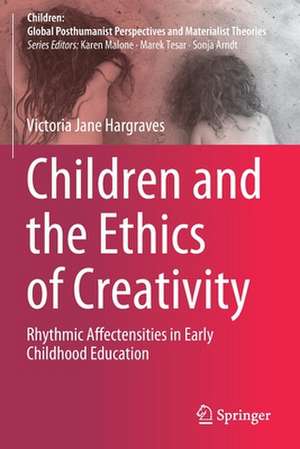Children and the Ethics of Creativity: Rhythmic Affectensities in Early Childhood Education: Children: Global Posthumanist Perspectives and Materialist Theories
Autor Victoria Jane Hargravesen Limba Engleză Paperback – 27 aug 2021
| Toate formatele și edițiile | Preț | Express |
|---|---|---|
| Paperback (1) | 636.45 lei 6-8 săpt. | |
| Springer Nature Singapore – 27 aug 2021 | 636.45 lei 6-8 săpt. | |
| Hardback (1) | 642.68 lei 6-8 săpt. | |
| Springer Nature Singapore – 27 aug 2020 | 642.68 lei 6-8 săpt. |
Preț: 636.45 lei
Preț vechi: 748.76 lei
-15% Nou
Puncte Express: 955
Preț estimativ în valută:
121.82€ • 132.37$ • 102.40£
121.82€ • 132.37$ • 102.40£
Carte tipărită la comandă
Livrare economică 21 aprilie-05 mai
Preluare comenzi: 021 569.72.76
Specificații
ISBN-13: 9789811566936
ISBN-10: 9811566933
Ilustrații: XXI, 191 p. 34 illus., 8 illus. in color.
Dimensiuni: 155 x 235 mm
Greutate: 0.31 kg
Ediția:1st ed. 2020
Editura: Springer Nature Singapore
Colecția Springer
Seria Children: Global Posthumanist Perspectives and Materialist Theories
Locul publicării:Singapore, Singapore
ISBN-10: 9811566933
Ilustrații: XXI, 191 p. 34 illus., 8 illus. in color.
Dimensiuni: 155 x 235 mm
Greutate: 0.31 kg
Ediția:1st ed. 2020
Editura: Springer Nature Singapore
Colecția Springer
Seria Children: Global Posthumanist Perspectives and Materialist Theories
Locul publicării:Singapore, Singapore
Cuprins
1 Starting Stratified: The Highchair.- 2 Framing the Creativity of Chaos.- 3 Relations in/between Content and Expression: Moving beyond "This is a cow and a cow says moo".- 4 Mapping Expression as the Monstrosity of an Earthquake Meets Doing-Curriculum.- 5 Assembling Thought: Experiments in Juxtaposition.- 6 How Creative is Subjectification? Capturing Contingency in the Subject.- 7 Working the In-betweens of Material Expression.- 8 Repetition, Refrain, Creativity.- 9 The Affect of Language: Order-in(g) the Child's World of Bees.- 10 Making Creative Sense of Chaos.- 11 Concluding Rhythms: To Dance.
Notă biografică
Victoria Hargraves is a researcher, mother, and teacher living in Tasmania with her husband and two children. She has a long career in teaching, both in the UK and in New Zealand, at primary and early childhood levels, within the state sector and in commercial and not-for-profit organisations. She has held several leadership roles, where she found important principles for working with children, such as empowerment, self-determination, self-belief and encouragement, to be just as relevant for teachers.
Inspired by a study tour to Reggio Emilia, she became fascinated by the potentially limitless creativity of children’s thinking about the world, and convinced of a strong impulse for conforming, narrowing and dismissing of children’s ideas which occurs as a result of an attempted socialization into the logical adult world of classification, categorization and knowledge. Stumbling through the first years of a PhD, it was not until she read Deleuze and Guattari’s notion of the rhizome that she began to make sense of a process for accessing wide potentialities inherent in matter but disguised by logic and classification. She puzzled (and continues to puzzle) over these ideas as, post-PhD, she researches aspects of early childhood education for dissemination online, while home-schooling her children and wondering how to enact a Deleuzian sensibility for the education of her children, and the life she shares with her children and a multitude of non-human others, including animals, birds, trees, river, wind and sun. She lives and learns as she opens herself up to a life living in concert with child, nature and the material world, and tries to succumb to their influence in a mutual determination of how events unfold in this place we find ourselves.
Textul de pe ultima copertă
This book presents a critical reimagining of education and educational research in addressing practices of representation and their relation to epistemology, subjectivity and ontology in the context of early childhood education. Drawing on posthumanist perspectives and the immanent materialism of Deleuze & Guattari to conceive of early childhood education, childhood and indeed, adult life, in new ways, it highlights the powerful role of language in subjectivity and ontology, and introduces affectensity as a concept which can be put to work to undo habitual relations and meanings. It proposes that ethical becomings require the engagement of an expansion and intensification of a body’s affect or capacity, and offers readers a provocation for enhancing creative capacity as an ethic. This book is an important contribution to the discussions on methods for living and of ways of thinking commensurate with the orientation of a posthuman turn.
Caracteristici
Develops strategies for enhancing creative capacity and becoming in a posthuman world Explores examples of children’s everyday experiences in early childhood settings Offers solutions for the enactment of posthumanist principles











